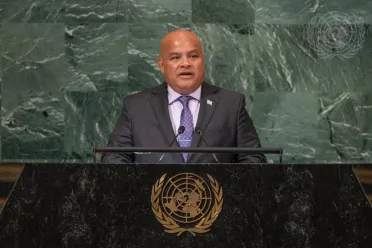Statement
Statement summary
DAVID W. PANUELO, President of the Federated States of Micronesia, said that his country’s foreign policy is to be a “friend to all and an enemy to none.” Expressing support for Ukraine, he strongly encouraged Member States, particularly those with greater influence and means, to firmly stand with that country’s people and Government and show that aggressive, violent behaviour won’t be tolerated, as “an infringement on the rights of one is an infringement on the rights of us all”. Amid traditional security concerns, anthropogenic climate change is the most enduring security threat facing his Pacific island country, he underscored, urging the international community, especially developed countries, to commit to the Paris Agreement goals by providing adequate, accessible and concessional finance for climate mitigation and adaptation, as well as for loss and damage. To that end, he called for the adoption of an agenda item for the Twenty-seventh Session of the Conference of Parties to the United Nations Framework Convention on Climate Change on a Loss and Damage Response Fund, the establishment of that Fund in the Conference, and its full operationalization to be completed in the twenty-eighth Conference.
Current efforts to reduce greenhouse gas emissions are wholly inadequate, as many actors continue to engage in the worst emitting activities, he said. Noting that carbon dioxide reduction alone will not cool the planet in the near-term, he urged all countries to commit to the Kigali Amendment and the Global Methane Pledge of a 30 per cent reduction in methane emissions from 2020 levels by 2030. He called on the United States and China to resume cooperation on tackling climate change, stressing: “Your capacity to cooperate on climate change is necessary towards ensuring our world is habitable for future generations, and does not suffer from civilizational collapse”.
The Organization’s Pacific Multi-Country Office (MCO) in the Federated States of Micronesia has added value to his country’s COVID-19 response and access of available funding sources and technical support through the United Nations system, he said. “Small Island Developing States such as Micronesia are in dire need of support from our partners to support our country-driven development strategy,” he said, noting that distance remains challenge in providing service delivery and commending United Nations agencies for reaching every island in the country and in the subregion, including vulnerable outlying islands.
Despite the successful conclusion of the ocean conferences in Palau and Lisbon, critical works remains to fully protect ocean resources, which are a common heritage of mankind, he said, stressing that his country looks forward to the resumption and conclusion of the Biodiversity Beyond National Jurisdiction Treaty negotiations very soon. A member of the Alliance of Countries for a Deep-Sea Mining Moratorium, the Federated States of Micronesia believes that deep seabed mining in the International Seabed Area should not occur until the precautionary principle, ecosystem approach and the “polluter pays” principle have been implemented, or until a set of exploitation regulations by the International Seabed Authority are finalized. With some of the largest fishing grounds in the Pacific, spanning 1.1 million square miles, and one of the most productive tuna fisheries in the Western and Central Pacific, he said his country’s maritime zones are exposed to threats of transnational crimes and illegal activities. He therefore called on partners to support the country’s efforts to build law enforcement capacity in maritime surveillance to address money laundering and terrorist financing, drug trafficking and other transnational crimes. To this end, he thanked Australia, Japan and the United States for the support provided, and invited other States to offer more aid.
He expressed the country’s “gravest concern” about Japan’s decision to discharge, starting next year, nuclear-contaminated water, otherwise known as Advanced Liquid Processing System (ALPS) water, into the ocean. “We cannot close our eyes to the unimaginable threats of nuclear contamination, marine pollution, and eventual destruction of the Blue Pacific continent,” he underscored. Touching on key structural reforms undertaken by the leaders of the Pacific Islands Forum, he called on all countries who engage with the Pacific to support and respect the 2050 Strategy for the Blue Pacific Continent.
Full statement
Read the full statement, in PDF format.
Photo

Previous sessions
Access the statements from previous sessions.
